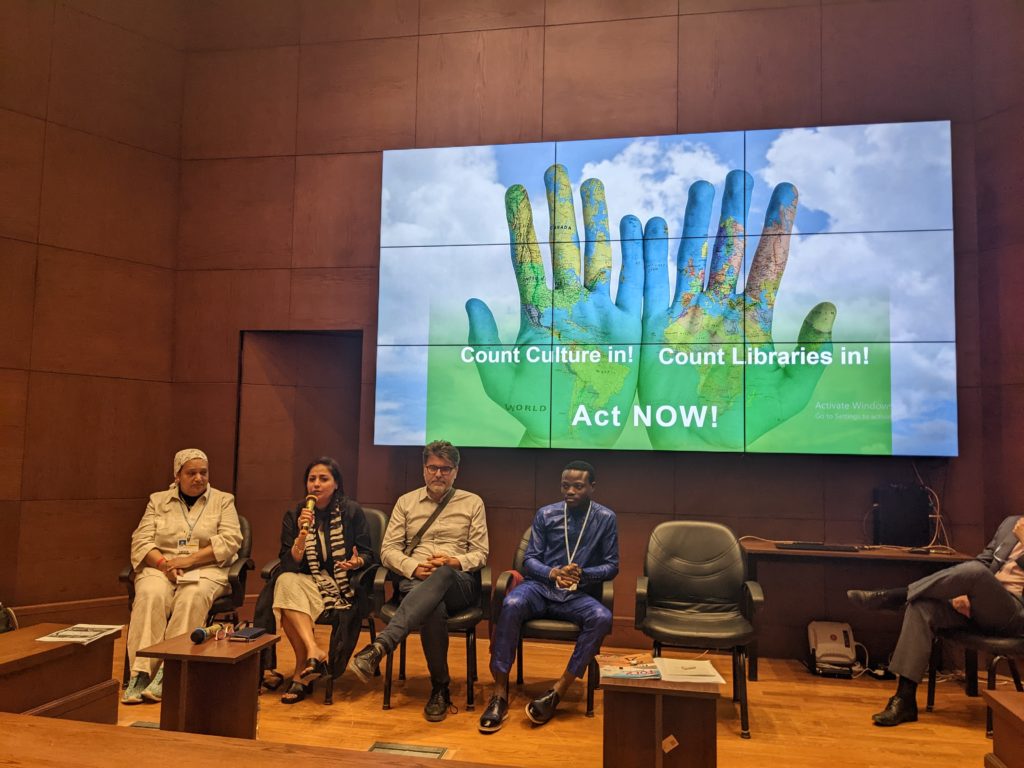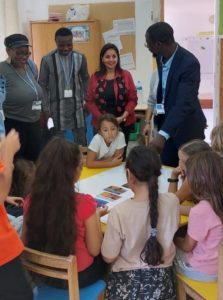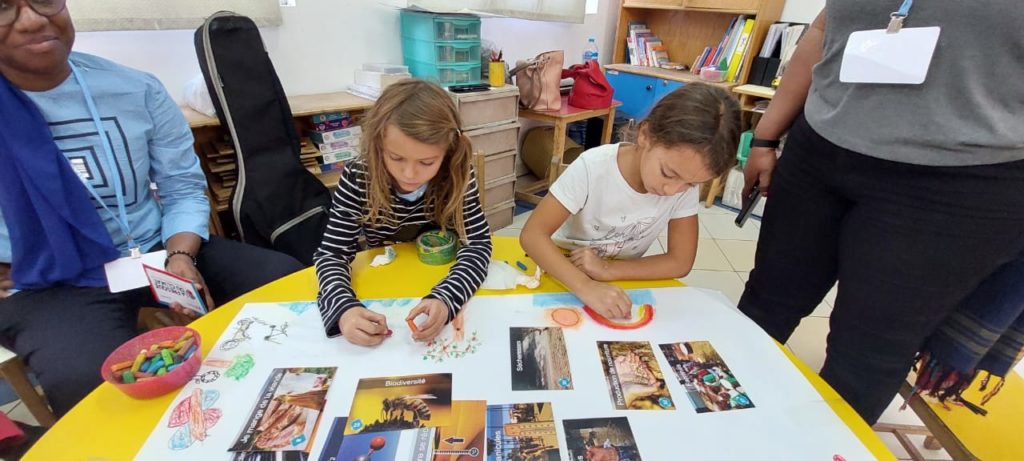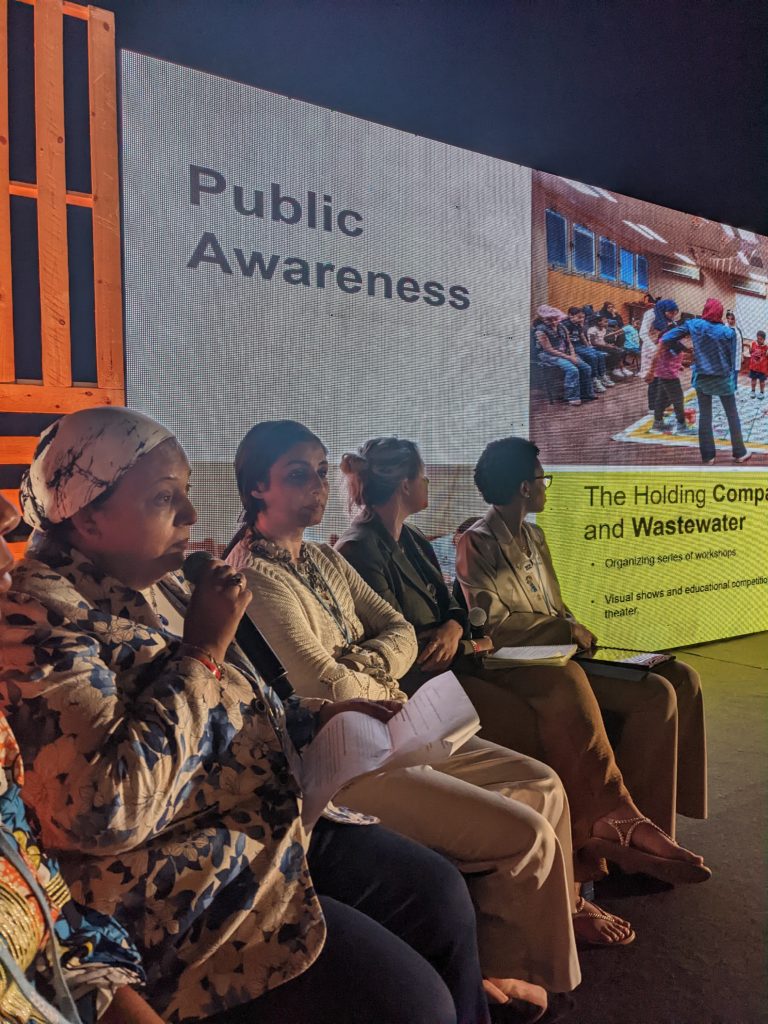Library Professionals at COP27: Reflections on attending the 2022 UN Climate Change Conference
12 December 2022
From 6-20 November 2022, 35,000 delegates from 190 countries, including more than 90 heads of state, came together in Sharm El Sheikh, Egypt, for the 2022 UN Climate Change Conference – COP27.

Thanks to our participation in the Climate Heritage Network, IFLA was excited to bring a small delegation to Sharm El Sheikh to take part in the first week of COP27. This offered opportunities to bring library perspectives into the discussion and explore possibilities for the library field to engage in climate action even further.
Two members of IFLA’s MENA Regional Division Committee, Dr Marwa El Sahn and Dr Heba Ismail Muhammad, travelled to Sharm El Sheikh to participate in several days of COP27.
In this interview, they share more about their experience at this high-level UN event and why library participation in these spaces matter.
Could you briefly describe your experience at COP27?
Heba:
COP27 was an extraordinary experience; I am glad that I could join this year, thanks to IFLA for nominating and supporting me during this amazing journey!
During Youth and Future Generations Day (10 November 2022), I had an opportunity to attend a Blue Zone event titled, “Young Africa: the vehicle of climate action: stories from Egypt and the broader African Continent”.
The session demonstrated the results of a survey conducted on 199 African youth about their expectations and what they want to see in COP27. The results showed that 64% found adaptation as a first priority followed by sustainable food and educational training.
The survey also tackled many issues like solutions youth would like to see to address their concerns. The results revealed that youth want supporting funds, green jobs, food security, and water. Youth were asked about the format of climate change events they will be most conducive. They believe that the best is networking and knowledge, training, and dialogue with policymakers.
At the Green Zone, I was among the speakers who highlighted good practices from a range of cultural stakeholders and share diverse examples of how cultural actors can help translate the priority areas of Action for Climate Empowerment (ACE) into practical actions to inspire others. The session was titled: “Culture, Heritage, and the Arts Accelerating Climate Empowerment: Partnering with the culture sector to implement ACE”. I focused on the activities, programmes and events conducted by public libraries in Egypt regarding climate change within the framework of ACE.
Watch this Side Event here:
On November 11th, I had the pleasure to participate on an event entitled “#ArtCultureHeritageCOP27 at the Sharm el-Sheik Museum”. My colleague Marwa El Sahn along with Claire McGuire moderated a session entitled “Climate Education for all: Linking Culture, Education, and Climate Empowerment”.
I replicated my presentation to a different audience and gave many examples of what public libraries do regarding ACE, examples were shown from Bibliotheca Alexandrina (BA), Misr Public Library System (MPL); Egypt’s Society for Culture and Development (ESCD) and Greater Cairo Library.
Count Libraries In!
This is the transcript and slides of the presentation given by Dr Heba Mohamed Ismail (IFLA Regional Division Committee for MENA) during two events on Action for Climate Empowerment (ACE) at the 2022 UN Climate Change Conference (COP27).
Marwa:

It was my first time participating in the UN Climate Change Conference (COP27) organised by the Unites Nations at Sharm El Sheikh, Egypt, and I would like to thank IFLA for recommending my name as a national representative within the Cultural Heritage Network (CHN).
Participating in this volunteer work resulted in interesting cooperation with professionals and specialists in different fields related to culture from around the world.
We met via Zoom many times to exchange ideas, think together, propose different themes and formats of activities. It was especially challenging given that the period of the COP is more than 10 days and we wanted to organise a variety of sessions in the green and blue zones, as well as in different cultural venues (museums, libraries, schools, etc.) to raise the voice of culture among the scientific themes of COP27.
You engaged in activities that concerned climate education and empowerment – both with local school children and at COP27 during Youth and Future Generations Day. What have you taken away from the experience of engaging students and young people in climate education?
Heba:
COP27 President H.E. Sameh Shoukry, during his visit to the Children and Youth Pavilion, said that “the impacts of climate change have significant effects on the health, nutrition, education and the future of young people, meanwhile youth stands to be the most impacted by the decisions we take at the climate process. Thus, they should be considered a natural ally and partner in driving climate action” [source].
COP27 ensured that the voices of the young people were heard as they were given an official space and a seat at the table and to be part of the climate change conversation, for the first time ever!
It is worth mentioning that Africa is the only region where the population of youth is increasing! I am seeing clearly that young people can make a difference, as they will play a pivotal role over the next decades. It is important for libraries and librarians to support youth in their steps and action towards this transition and against climate change issue.
Climate change affects our lives and defines how future generations will exist and relate to the environment, so attention should be given more to youth since they are the next generation who will inhabit the planet.
We should invest more in them. Libraries and librarians should work more to find new ways and mechanisms to engage and encourage youth in climate change action framework and to help build a greener future and to connect youth to initiative and other opportunities related to climate change.
Youth should be part of the climate change conversation to make a real difference in the environment, and we should ensure that they would participate at COP28 alongside the policymakers, instead of having only a voice, to collectively mitigate the climate crisis.
Marwa:
I had a fruitful experience organising two workshops for the students at the French school at Sharm El Sheikh. One workshop was animated by a francophone artist from Benin, who used his book as a main tool to show and share his country’s heritage to the Egyptians kids. Using his guitar and singing with kids encouraged the audience to follow along with attention, in order to learn about a different country, its monuments, lifestyle, language and much more.

The second workshop, featuring a group of students from the environment department of Senghor University at Alexandria, was another success. We had planned to work only with preparatory and secondary classes, but as the primary classes showed their interest too, it was offered to all the students regardless of their age.
The workshop included engaging students in a card game featuring climate and environmental phenomena. Each student selected a card, read the definition of a word (volcano, earthquake, etc…), and explained the meaning, reason, and how to protect and to prevent it. This was an opportunity to listen and to teach scientific information in an easy and simplified way.
Why should librarians get involved in climate issues?
Marwa:
As a librarian who believes in her professional mission, especially with the vital role of libraries in our societies and after my participation at the COP27, in different sessions at schools, conference venue and the national museum of Sharm El Sheikh, I can admit that our participation is essential and not optional.
I also encourage IFLA to continue working with the CHN and participate in future COPs. It would be beneficial for IFLA to grow their official relationship with the UNFCCC in order to facilitate more participate in the Blue Zone at future conferences.
From the technical and content-related side, libraries are playing an important role not only by giving access to information through books, periodicals and AV materials, but also by facilitating access to climate information through different activities (workshop, conference, festival, etc.).
Heba:
Libraries are cultural community hubs. Librarians are trusted among the users they serve, they can reach their communities and build strong relationship and networks, as they are good connectors.
Librarians know how to advocate well regarding issues related to their communities, and that includes, of course, climate change and what needs to be done to elevate the work led by the community to adapt to the climate crisis.

As advocates, librarians are at the forefront to reach and influence decision-makers. They are therefore in an excellent position to fight against climate change.
Librarians can serve as catalysts for addressing climate issues. Through their dedicated work, they can easily increase the impact of the library sector in bringing better sustainable climate future. Librarians are also skillful professionals and safeguard of information resources providing reliable information, not false and misleading information, regarding climate change.
Librarians can help by offering safe spaces for the community. They can also create an enabling environment for young people’s engagement where their views and recommendations are respected and valued, where they can exchange ideas and talk about climate issues.
Librarians are exerting collective effort to advance environmental education and climate action for future. Since the current education systems are not always a good supporter in learning about climate change crisis, libraries and librarians are the bridge, which can fill this gap by offering climate information through books, programmes, and different platforms.
I would like to conclude my interview by the quotation from Theodore Roosevelt: “Do what you can, with what you have, where you are.”
So as librarians, as catalysts, as community connectors, we should ACT NOW!
Find out more on COP27: The 2022 UN Climate Change Conference (COP27): Outcomes and opportunities for libraries
For more on Action for Climate Empowerment: A Pledge for Climate Empowerment: Count Libraries In!
IFLA HQ Contact: Claire McGuire (claire.mcguire@ifla.org)